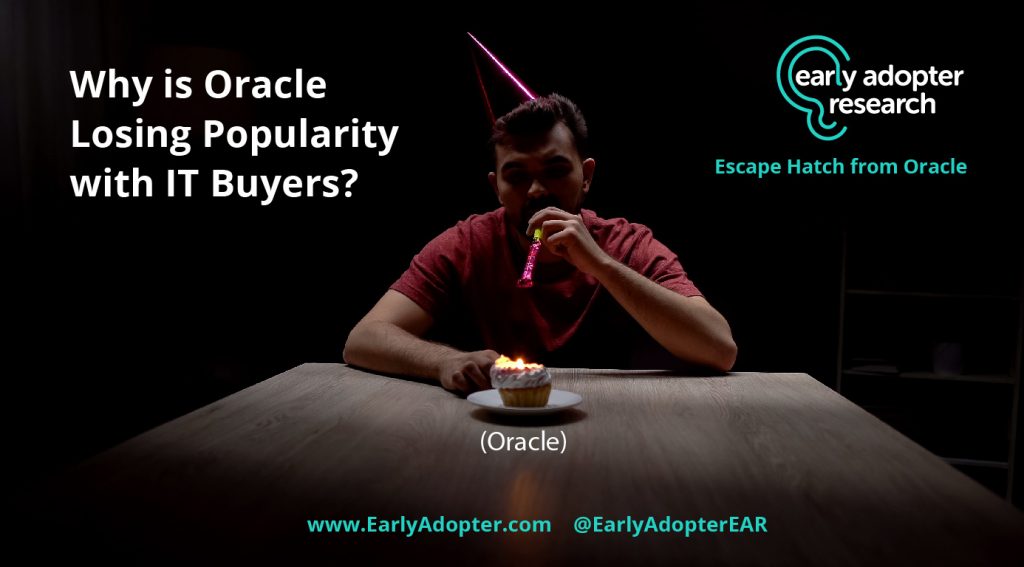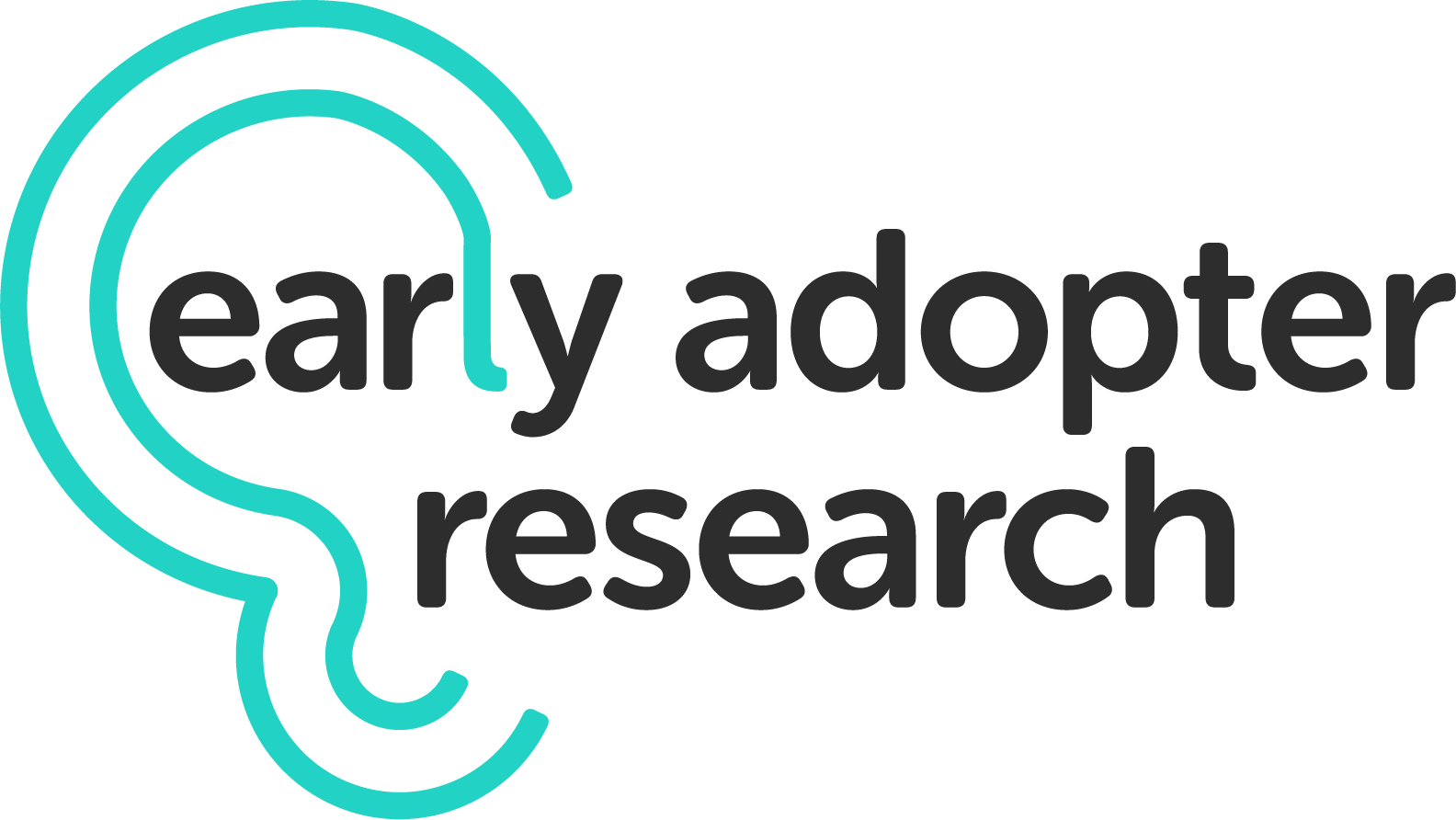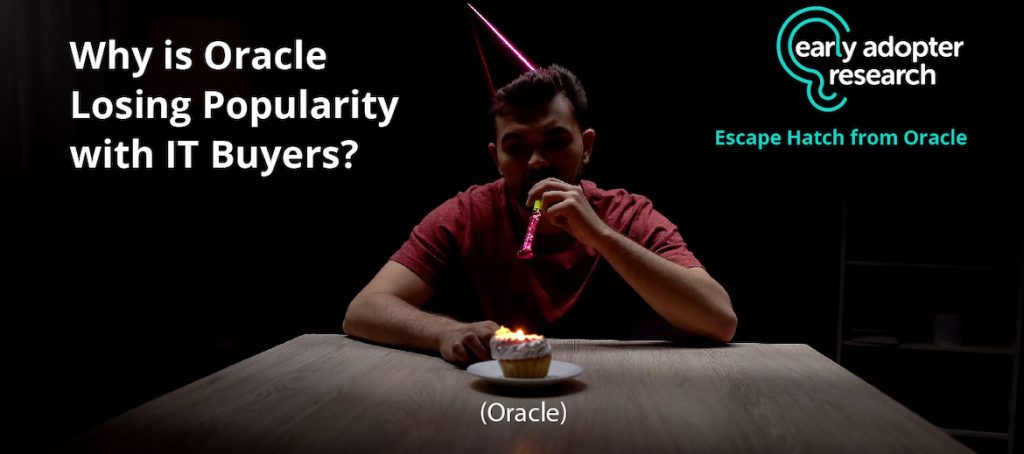The Escape Hatch from Oracle Research Mission takes a close look at the state of Oracle in the market. As stated in our Research Mission Declaration, one impetus for this mission is to inspire Oracle to pull back from some of its aggressive tactics, especially regarding audits. Our position is that Oracle has damaged its relationship with its customer base using these tactics. If this is true, then we should see some evidence of it in the market in terms of decreasing sales of Oracle products.
Here is the key question:
- Is Oracle Increasingly Unpopular with IT Buyers?
If Oracle is indeed damaging its relationship with customers, there should be evidence from real customers that supports this conclusion.
This story is about organizing and collecting evidence that answers that question both in the affirmative and in the negative. We will not only cover evidence that supports our position. This piece will be frequently updated with additional news about Oracle and we will also use it as a reference in subsequent articles in this series. It is a work in progress and will never be finished. Please do send us links to relevant evidence on both sides of the question.

Anecdotal Evidence
At a recent speech I gave at ProcureCon, I asked the audience to raise their hand if they would push a button to remove all Oracle technology from their technology landscape. About 75 percent of the people in the room raised their hands.
Many people who have been audited by Oracle have found the experience unpleasant and needlessly aggressive. Oracle is not the only company that performs software audits, but it seems to be the most aggressive and creates the most bad will in the process. This has been a long-standing problem that only seems to have exacerbated the frustrations of its customers over time. But many customers are also just frustrated with the lack of support they receive from Oracle over all.
Oracle does have enthusiastic customers and, as we say consistently, it has great products that help run the world. But our view is that Oracle is creating bad will through its sales and auditing tactics and if you ask around you will easily find confirmation among Oracle customers.
Sales Figures and Market Assessments
Recently, Oracle has had a decidedly mixed track record when it comes to sales. Yahoo reported that Oracle sales recently have been lagging, at least in terms of their traditional software offerings. According to Investor’s Business Daily, Oracle has been experiencing a consistently downward trend when it comes to the sales of its traditional software and hardware offerings. While in the second quarter of 2019, it did beat its earnings projections in part because of its cloud-based products, this didn’t clearly indicate that Oracle had a positive financial future. As that article notes, investors remain cautious, as Oppenheimer analyst Brian Schwartz noted that despite the earnings, “…one quarter doesn’t make a trend, and therefore it is unlikely to change the narrative on Oracle, which is that the company is facing challenges in trying to mitigate infrastructure share losses from multifaceted headwinds.”
Other news sources pointed out a disappointing financial outlook for Oracle. An article in Real Money detailed that Oracle’s revenue fell 1% compared to the February quarter of 2018, which was significantly lower than revenue trends for software companies in general. Additionally, the same article outlined that Oracle has undergone a wave of layoffs over the past year, with 3,200 Seattle workers and 900 Chinese workers laid off, and another 1,600 expected to be let go due to the closing of Oracle’s R&D efforts.
These pieces echo longer term negative financial trends for Oracle. In September 2018, in responding to Oracle’s quarterly stockholders call, The Street pointed out some disturbing themes about Oracle’s fiscal performance and operations in general. In addition to the downward line in software and hardware sales, the article urged Oracle to be more transparent and documented the large number of buybacks Oracle was engaging in.
That call for transparency is not surprising given what I pointed out in an article on Forbes in October 2018. I wrote how business analysts were becoming increasingly alarmed at how difficult Oracle was making it to understand the true revenue generation of its cloud offering and I referenced a Business Insider article that pushed the notion that Oracle was inflating its cloud adoption numbers, with many clients not really using the product at all.
Survey Findings
Survey results have been far more definitive regarding the sentiments of Oracle’s customers. An Apps Associates survey from August 2019 found that while a majority of Oracle customers want to shed their software and hardware products and move to the cloud with AWS or Microsoft Azure. However, they fear doing so because of the threat of an Oracle audit. Nearly 60% of the 300 executives surveyed said that were very or somewhat concerned that moving to a non-Oracle cloud provider would invalidate their current Oracle licenses and thus trigger an audit.
This is understandable given the research we’ve done showing how Oracle can go after clients who try to use other cloud providers. In an article I wrote for Forbes on Oracle’s strong arm tactics, I noted, “Oracle does a lot of its licensing through an unlimited licensing agreement (ULA), which allows customers to deploy an unlimited number of licenses at first and then eventually certify the number of licenses they actually want to use. If you have a ULA, once you certify, you can deploy these licenses anywhere. However, you can only certify on-prem licenses. For licenses you deployed on AWS or Azure, you have to buy new licenses. And at the moment you certify, since you can’t certify those licenses deployed on AWS or Azure, you are by definition out of compliance.” In that same piece, I covered how Oracle is trying to force its customers to use its own cloud and is limiting the number of support documents clients can download, which offers strong evidence that the company is not interested in getting customers to use its cloud product mainly based on the quality of the services provided.
This fear of auditing also feeds into the growing survey evidence that Oracle’s customers are sick of how they’re being treated. For instance, Arete Research Services reported in 2017 that 74% of CIOs plan to reduce their spending with Oracle. An analysis from J.P. Morgan’s Mark Murphy noted that “Oracle is losing its significance in enterprise IT” and that only 6.5% of surveyed customers viewed Oracle as indispensable to their business. That same survey of 154 CIOs also showed much higher favorability ratings for Microsoft and Amazon, with only 2% of respondents saying that Oracle’s cloud was integral to their operations.
Other surveys also back up the negative perceptions of Oracle. For instance, on the Customer Service Scoreboard, Oracle earns a rating of “terrible” with high rates of dissatisfaction about Oracle’s auditing techniques and lack of willingness and ability to resolve critical issues.
A Credit Suisse survey of 90 U.S. and European CIOs from January 2019 offered similar results. Vendors cite Oracle, along with IBM and Dell, as being the software vendors with whom they’d most likely decrease their spending.
So What Can IT Leaders Do?
If Oracle is in fact becoming unpopular among IT buyers, what are the alternatives?
While many would like to “push a button” and remove Oracle technology, it is not that easy. One approach that is gaining popularity among IT leaders is to start finding ways to rebalance their relationship with Oracle, focusing on ongoing and future IT spend.
Third-party support is one lever many CIOs, CFOs, and Procurement teams are leveraging as a means to not only dramatically reduce the amount of their annual maintenance and support fees, but reduce the grip Oracle has on their future IT roadmap decisions by freeing up access to working capital they can invest, without having to remove their current software assets.
Such an example comes from this Nucleus Research report that shows the dramatic savings available to companies that move to a model of third party maintenance.
The Escape Hatch From Oracle Research Mission is Sponsored by:
Oracle is a registered trademark of Oracle and/or its affiliates. Early Adopter Research is an independent firm and not associated with Oracle. © 2019 Early Adopter.



